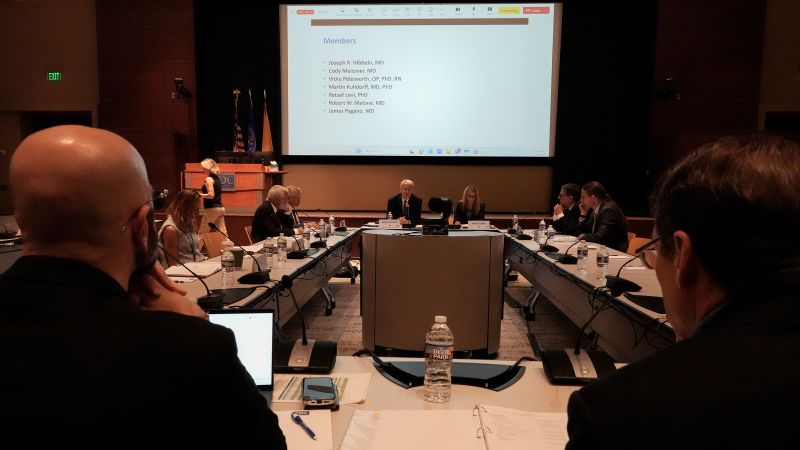The recent convening of the Advisory Committee on Immunization Practices (ACIP) marks a significant moment in the discourse surrounding vaccine guidelines in the United States. This inaugural meeting of a newly formed group of advisors taking place at the US Centers for Disease Control and Prevention (CDC) represents a shift in approach—one that is both controversial and pivotal. The group’s main objective, as articulated by its new chair, Dr. Martin Kulldorff, is to study established vaccine schedules and consider their cumulative effects on childhood and adolescent vaccination. The work groups will specifically examine critical elements such as the hepatitis B vaccine administered at birth and the widely utilized combination vaccine for measles, mumps, rubella, and chickenpox.
This first assembly of the newly appointed group occurred following a notable upheaval within the CDC’s external advisory structure. Health and Human Services Secretary Robert F. Kennedy Jr. had recently dismissed the prior committee, comprised of 17 vaccine experts, citing conflicts of interest. Within days, he appointed a fresh group of eight members; however, one individual’s withdrawal during the scrutiny of financial holdings resulted in a reduced committee of seven. This reshuffle has sparked widespread unease among public health experts, who are wary of both the committee’s unprecedented disbandment and the backgrounds of some of its new members. To the alarm of many, two of these advisers have previously served as expert witnesses against vaccines in legal trials, raising concerns about their impartiality. Additionally, another newly appointed adviser has controversially suggested, without substantial evidence, that COVID-19 vaccines may have contributed to an alarming rate of deaths among young people—a claim both unsupported and alarming.
Kennedy’s history preceding his current position, especially his leadership of the anti-vaccine group Children’s Health Defense, casts a further shadow over the committee’s credibility. He has expressed the belief that childhood vaccines have not been adequately studied, a stance sharply countered by pediatricians and infectious disease experts who argue that the data supporting vaccine safety is robust and comprehensive. This discord was exacerbated when the American Academy of Pediatrics (AAP) announced its withdrawal from ACIP meetings, declaring the process void of credibility in light of the recent committee dismissals.
In a statement reflecting their concern for children’s health and the politicization of vaccine recommendations, AAP President Dr. Sue Kressly emphasized that the organization would continue devising its own immunization schedule, firmly grounded in scientific evidence and expert opinion. This decision underscores the growing divide between established medical authorities and the new advisory body’s evolving direction.
Delving into the operational details of the committee’s agenda, Dr. Kulldorff has indicated intentions to review the interaction effects among vaccines, their cumulative components, and the timing of these vaccines—an elaboration that raises questions about the motives behind the revision of established recommendations. Moreover, Dr. Paul Offit, a prominent vaccine scientist affiliated with the Children’s Hospital of Philadelphia and an external FDA advisory panel member, has criticized the new committee’s plans as manifestations of an anti-vaccine agenda, thereby further polarizing the debate.
Two other new work groups established by Kulldorff will be tasked with evaluating vaccines that have not undergone assessment in over seven years, including the practice of administering the hepatitis B vaccine to newborns. Kulldorff mentioned that it may be reasonable to delay this vaccination unless the mother tests positive for hepatitis B. However, the CDC staunchly advocates for universal Hepatitis B vaccination at birth, emphasizing the preventive measures it offers to at-risk infants.
The debate around this particular vaccine is heated and fraught with emotion, as highlighted by past cases of preventable deaths attributed to hepatitis B infection among infants. The implications of altering longstanding vaccination protocols are profound, with potential repercussions for public health, especially considering the recent resurgence of diseases like measles. Vaccination rates for measles have plummeted, leading to nearly 1,200 cases in this calendar year alone, demonstrating the critical need for vaccines in controlling outbreaks and protecting vulnerable populations.
The ACIP’s recommendations historically bear significant influence, shaping insurance coverage and state vaccination policies. This evolving landscape necessitates rigorous scrutiny and public discourse surrounding the motivations and scientific basis of recent changes in vaccine advisory leadership, especially in light of the overarching goal of safeguarding public health in the face of ever-present vaccine skepticism. The journey to reform and re-establish trust in vaccine recommendations is crucial, and it requires a reconciliation between science-driven practices and the new committee’s objectives to ensure optimal health outcomes for children.












